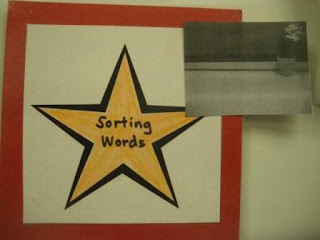
On our second trip to the library our amazing librarian had things ready for us to explore non-fiction books by looking at their parts. She had a bunch of non-fiction books out on a range of topics and the kids started by looking at the front cover of a book. They described all the parts of the cover they could find.
From there the explorations moved on to the title page and then to the middle of the book. Students noticed the publishing information, the table of contents, page numbers, pictures, and captions. It was fabulous. We moved on to look at the end of the book (index, glossary, more resources) but had to continue the lesson back in our classroom.

 For the next week students continued working on their books and conferencing with teachers.
For the next week students continued working on their books and conferencing with teachers.
 As we returned to reread our finished class book the kids decided we needed to add a table of contents. One girl added a 'Words to Know' section to her book and a bar code, "So other kids can check it out."
As we returned to reread our finished class book the kids decided we needed to add a table of contents. One girl added a 'Words to Know' section to her book and a bar code, "So other kids can check it out."
 Seeing their motivation and engagement in writing these books was really exciting. Both the kids and I are feeling more energized about writing workshop now. I'm so grateful to work with a librarian that does so much to support what happens in our classrooms.
Seeing their motivation and engagement in writing these books was really exciting. Both the kids and I are feeling more energized about writing workshop now. I'm so grateful to work with a librarian that does so much to support what happens in our classrooms.I'm hoping to post some pictures of our class book and some of the kids' books soon. Our next trip to the library will involve a writing celebration as we share all of our books and place them in a special basket in the school library for others to read.









